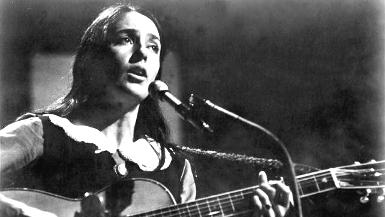 The great American singer and activist reveals the fear, insecurity, and private struggles of her inner life that lay behind her public persona.
The great American singer and activist reveals the fear, insecurity, and private struggles of her inner life that lay behind her public persona.
When the singer Joan Baez was planning a farewell tour in 2019, after a career spanning sixty years, she gave the green light to a documentary to be made about her by three women filmmakers: Miri Navasky, Maeve O’Boyle, and Karen O’Connor. Finally released this year, it’s called Joan Baez: I Am a Noise. I confess that I was a little taken aback by the title. Baez has one of the most beautiful voices in the world, so it’s odd to hear the word “noise” used to describe her. But as we soon discover, it’s she who wrote “I am a noise” in her journal she kept as a teenager, and she wasn’t referring to her voice, but to a startling lack of self-worth in the midst of a life with which she found it difficult to cope, even after achieving fame and success. It is this contrast between the person known to the general public, and the private Joan with her secrets and insecurities, that lie at the core of this excellent movie.
For this is not your usual biographical film about a popular artist or public figure, which in the case of a musician would include a detailed account of that person’s career and recordings, and interviews with friends and other people in the business talking about her, along with extensive concert footage. And yes, here we do get an outline of Baez’s career, enough for those not familiar with her. The only interviews are with Joan herself and older ones with her parents and two sisters. We also hear tape recordings of talks by her therapist. This film is about Joan Baez’s long inward journey of self-discovery.
She was a sensitive girl, prone to spells of anxiety and illness, who started singing as an escape from what she felt as the pressures of life. We see her debut at the first Newport Folk Festival when she was 18, and her sudden fame and popularity in the folk revival of the early 1960s. She was really young and inexperienced in the world, and public adulation couldn’t help but go to her head. Despite this, she began to feel a lack of purpose, which is when she turned her energies to the civil rights movement. She sang with Dr. King in the South, and sang at the 1963 march on Washington. She also met Bob Dylan, helped promote him to the world, sang with him, and of course they became lovers. Baez is very frank about this part of her life, and how it ended with Dylan basically dropping her, and admits that he broke her heart. Then she relates the story of her marriage to peace activist David Harris, and how good that was, until it stopped being good.
But behind all these life events, Baez takes responsibility for something in herself that couldn’t get close to anyone. The deep bond, and then the painful rivalry, between her and her sister Mimi becomes a key link in the story. Mimi had her own singing career, still always feeling like she was in the shadow of her older sister, and her life was scarred by depression and drug addiction. Talking about Mimi, Joan gains access to her own pain from childhood experiences that crippled her ability to love herself. The last part of the film is a deep dive into painful repressed memories of her parents and family.
As a teenager, I was kind of in love with Joan Baez from afar. I idealized her and thought of her as perfect. In Joan Baez: I Am a Noise, she skillfully takes apart that illusion to reveal the struggling and troubled woman she’s always been, leaving us with this exquisite gift of honesty and healing.

A drama of a woman unjustly ostracized reveals deeper meanings, in a breakthrough work of Mexican cinema. María Candelaria, a 1943 film by Emilio...

Joanna Hogg continues her semi-autobiographical portrait of the artist, a young woman filmmaker in 1980s England exploring grief. The Souvenir: Part II is the...

A veteran of Soviet cinema presents a powerful drama about an incident in 1962, when factory workers in a Don Region city go on...